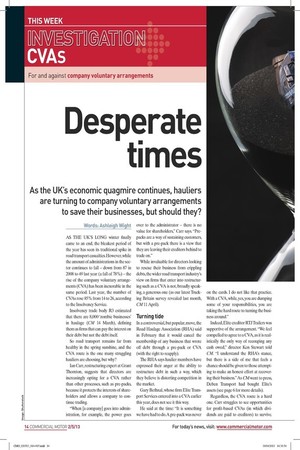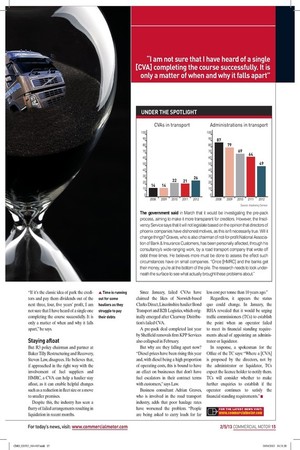esperate times As the UK's economic quagmire continues, hauliers are
Page 9

Page 10

If you've noticed an error in this article please click here to report it so we can fix it.
turning to company voluntary arrangements to save their businesses, but should they?
Words: Ashleigh Wight AS THE UK'S LONG winter finally came to an end, the bleakest period of the year has seen its traditional spike in road transport casualties. However,while the amount of administrations in the sector continues to fall — down from 87 in 2008 to 49 last year (a fall of 78%) — the rise of the company voluntary arrangements (CVA) has been inexorable in the same period. Last year, the number of CVAs rose 85% from 14 to 26, according to the Insolvency Service.
Insolvency trade body R3 estimated that there are 8,000 'zombie businesses' in haulage (CM 14 March), defining them as firms that can pay the interest on their debt but not the debt itself.
So road transport remains far from healthy in the spring sunshine, and the CVA route is the one many struggling hauliers are choosing, but why?
Ian Can, restructuring expert at Grant Thornton, suggests that directors are increasingly opting for a CVA rather than other processes, such as pre-packs, because it protects the interests of shareholders and allows a company to continue trading.
"When [a company] goes into administration, for example, the power goes over to the administrator — there is no value for shareholders," Carr says. "Prepacks are a way of sustaining customers, but with a pre-pack there is a view that they are leaving their creditors behind to trade on."
While invaluable for directors looking to rescue their business from crippling debts, the wider road transport industry's view on firms that enter into restructuring such as a CVA is not, broadly speaking, a generous one (as our latest Trucking Britain survey revealed last month, CM 11 April).
Turning tide In a controversial, but popular, move, the Road Haulage Association (RHA) said in February that it would cancel the membership of any business that wrote off debt through a pre-pack or CVA (with the right to reapply).
The RHA says haulier members have expressed their anger at the ability to restructure debt in such a way, which they believe is distorting competition in the market.
Gary Bethnal, whose firm Elite Transport Services entered into a CVA earlier this year, does not see it this way.
He said at the time: "It is something we have had to do. A pre-pack was never on the cards. I do not like that practice. With a CVA, while, yes, you are dumping some of your responsibilities, you are taking the hard route to turning the business around."
Indeed, Elite creditor RTJ Trailers was supportive of the arrangement. "We feel compelled to agree to a CVA, as it is realistically the only way of recouping any cash owed," director Ken Stewart told CM. "I understand the RHA's stance, but there is a side of me that feels a chance should be given to those attempting to make an honest effort at recovering their business." As CMwent to press, Deben Transport had bought Elite's assets (see page 6 for more details).
Regardless, the CVA route is a hard one. Carr struggles to see opportunities for profit-based CVAs (in which dividends are paid to creditors) to survive. "If it's the classic idea of park the creditors and pay them dividends out of the next three, four, five years' profit, I am not sure that I have heard of a single one completing the course successfully. It is only a matter of when and why it falls apart," he says.
Staying afloat But R3 policy chairman and partner at Baker Tilly Restructuring and Recovery, Steven Law, disagrees. He believes that, if approached in the right way with the involvement of fuel suppliers and HMRC, a CVA can help a haulier stay afloat, as it can enable helpful changes such as a reduction in fleet size or a move to smaller premises.
Despite this, the industry has seen a flurry of failed arrangements resulting in liquidation in recent months. Since January, failed CVAs have claimed the likes of Norwich-based Clarks Direct, Lincolnshire haulier Bond Transport and B2B Logistics, which originally emerged after Clearway Distribution's failed CVA.
A pre-pack deal completed last year by Sheffield removals firm l(PP Services also collapsed in February.
But why are they falling apart now? "Diesel prices have been rising this year and, with diesel being a high proportion of operating costs, this is bound to have an effect on businesses that don't have fuel escalators in their contract terms with customers," says Law.
Business consultant Adrian Graves, who is involved in the road transport industry, adds that poor haulage rates have worsened the problem. "People are being asked to carry loads for far less cost per tonne than 10 years ago."
Regardless, it appears the status quo could change. In January, the RHA revealed that it would be urging traffic commissioners (TCs) to establish the point when an operator failed to meet its financial standing requirements ahead of appointing an administrator or liquidator.
In response, a spokesman for the Office of the TC says: "Where a [CVA] is proposed by the directors, not by the administrator or liquidator, TCs expect the licence holder to notify them. TCs will consider whether to make further enquiries to establish if the operator continues to satisfy the financial standing requirements." •







































